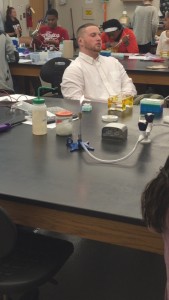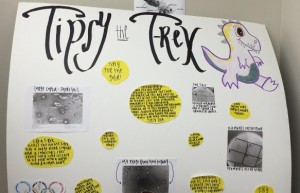Story co-written with Alexandra McQueen
Freshman and transfer students eagerly waited to take Biology 493- Phage Hunters with Dr.Wallen and Dr. Gainey after hearing about it at freshman orientation.
“Nothing builds confidence more than being able to just do something,” said Dr. Maria Gainey. And that is what their students do.
The class is designed around finding a bacteria phage, a virus that infects other bacteria, from a soil sample acquired on campus by each student at the beginning of the semester. Once the phages were found, the students purified them and did experiments with them. Every phage is unique and different, which is why the experiments progressed and intensified throughout the semester. Two phages worked with in the lab were sent off to Howard Hughes Medical Institute (HHMI) at the end of November for future studies.
To take the class, the student must be a Biology or Chemistry major since most of these students are pursuing the scientific field. Freshman student Erin Cafferty majoring in Pre-Health Biology with a Chemistry Minor thinks this class has been a great opportunity for her.
“It is my favorite class I’m even doing an honors contract for it. Yet, it is definitely something you have to be passionate about it,” said Erin Cafferty.
The students in the classroom feel like they have accomplished a lot thanks to both of their professors and their teaching assistant.
Towards the end of working with their phages, the class put on a “Phage Olympics” where students competed to have their phages sent off to Howard Hughes to be further investigated and to be sequenced for DNA. Only two students’ phages were chosen.
The First Place Phage Winner, Aaron Stevens, is a freshman at WCU and is majoring in Pre-Med Biology with a Minor in Business.
“It was kind of a big deal that it got sent to Howard Hughes and it felt good to be able to find out more about its genome,” said Stevens.
See the video story.
Western Carolina University applied for the HHMI Grant Program called Science Education Alliance-Phage Hunters Advancing Genomics and Evolutionary Science (SEA-Phages) in order to give students a better learning opportunity. This program has been highly recognized because our school was one of the 17 out of 44 schools in the nation to be chosen.
“Like every biology class, there was the intro to basic pipetting, basic measurement skills, the goal to discover a phage, pure phage, population, purifying a phage, genome sequencing, annotating the genome, and so much more. Most of the class does indeed come back next semester and a few new students,” said Dr. Gainey.
With this grant, the course is taught over the span of two semesters. Next semester the students will be working with the two winning phages. The students will continue to purify them and study them.





